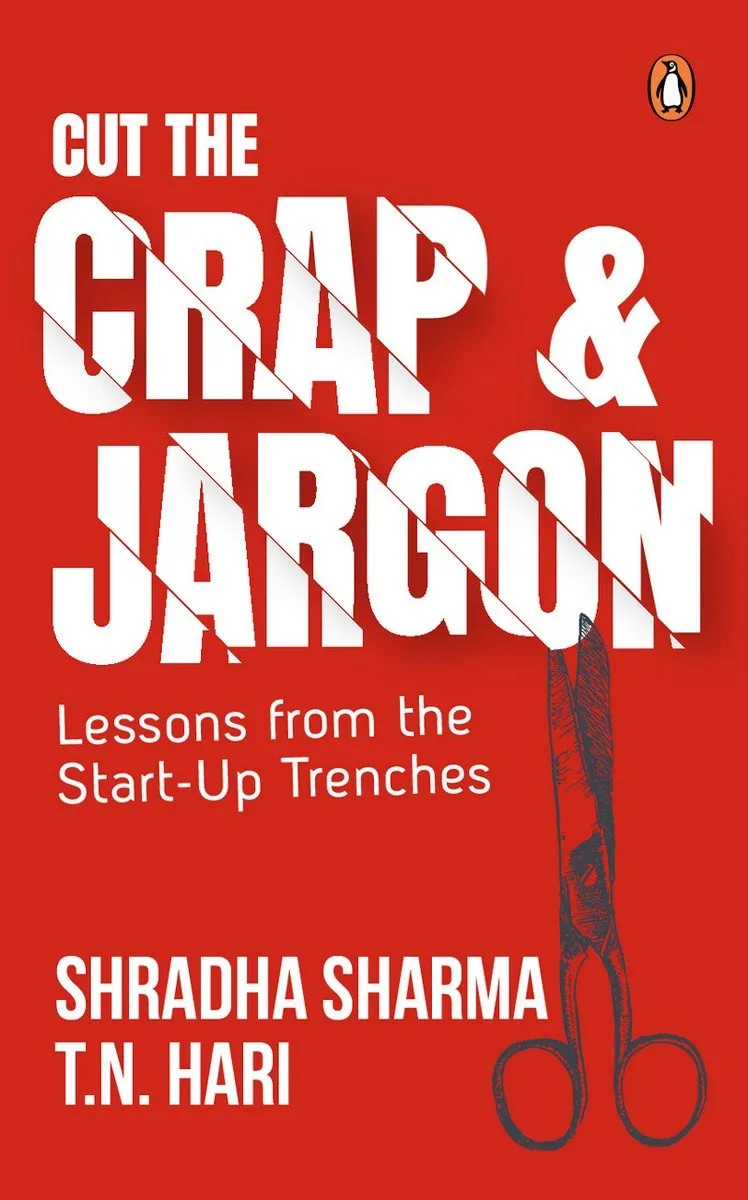Startup lessons learned the hard way: new book shows how ‘small’ things can have big consequences for entrepreneurs
Shradha Sharma, Founder and CEO of YourStory, and TN Hari, HR Head at BigBasket and advisor at Fundamentum, have put together a detailed book on the struggles that entrepreneurs face in the trenches of their startup journey. From deep dives to visionary stories, the takeaways will be useful for founders, mentors, managers, and researchers.

“Entrepreneurship is a journey and not a destination. In this journey, one makes choices that are excruciatingly hard,” explains Deep Kalra, CEO of MakeMyTrip, in the foreword of Cut the Crap and Jargon: Lessons from the Startup Trenches, by Shradha Sharma and TN Hari. The speed of change is relentless, and founders learn through “baptism by fire.”
While books about management and leadership are useful, what founders really value is timely, contextual and high-quality advice from fellow entrepreneurs. “Some of the small things may come across as trivial at first sight,” according to the authors, but they can trip up a startup further down the road.
The 320-page book is spread across 31 chapters, and also includes insights from seasoned investors (Prime Venture Partners, Kalaari Capital) and successful entrepreneurs (Viral Shah, Alan Cooper, Sanjeev Aggarwal). The appendix has a useful list of six startup competencies (see summary in Table 1). Effective founders are assertive, have uncluttered thinking, create capacity, have a bias for action, know how to prioritise, and can envision and think ahead.
Table 1: The Six Startup Competencies
The book makes for a useful and practical read, and does a good job of identifying the red flags in hiring, firing, funding, scaling, teamwork, and internal communication. Here are eight clusters of takeaways and tips for startup founders.
- Understanding startup businesses
The authors define a startup as a private entity in which the founders are still active and in executive roles; it is either bootstrapped or VC-funded. They operate in fluid contexts where pivoting and learning from failure are needed. Decisions are made from a combination of data, insights and a gut feel. Founders need to have “full stack” capabilities and learn continuously.
“Those who relish startups are the ones who see strategy in humble acts of execution and can clean the shit without complaining,” the authors explain. “Polish and sophistication pale in front of execution, intellect and simplicity,” they add. The startup journey is not for the weak at heart.
- Startup culture
“Culture is all about the behaviours that are encouraged and rewarded,” the authors explain. Founders create culture consciously and unconsciously, and the startup’s culture evolves as more people join and contribute to the organisation.
Founders should reflect on their own activities and attitudes because this shapes the employee perceptions of loyalty, performance, integrity, speed, responsiveness, customer focus, and ethics. Much of culture is tacit and goes way beyond value statements and office layout.
Founders should be wary of toxic elements creeping into the culture during the mad rush of entrepreneurial hustle. Founders should show empathy, seek inputs, collaborate extensively, and give genuine praise. Failure and rejection can ironically become an opportunity in disguise, and can steel a founder’s grit, resolve and tenacity to succeed.

- Hiring
Early employees should have ability to execute and be willing to handle the rough and tumble of startup life. They should be team players, team builders, service-oriented, customer focused, and don’t need follow-ups. It is good to give initial employees some sweat equity; they may go through “near-death” experiences along with founders in the early stages of proof of concept.
Hiring considerations change as the startup grows. “A majority of the individuals who have worked in a scale environment have no clue about what it takes to build for scale,” the authors caution. Founders should cultivate good relationships in the ecosystem because they may need to woo people from their existing jobs and join their startup. “Every wrong hire sets you back, forces you to firefight,” the authors warn.
Founders should be able to have critical, insightful and meaningful conversations with new leaders. Checking references is important. New hires should be able to think from the ground up, be hands-on, and have a high degree of self-awareness. Older employees should work with the new ones, give them a chance to perform, and not resist change.
One chapter provides useful interviewing tips, eg., ask a mix of open-ended, close-ended, probing, and competency-based questions (70 per cent of the time). Allow the candidate to ask questions as well; look at thought process, motivation and intellectual capacity.
Another chapter discusses the role of stock options for old and new employees in a funded company. Some employees are more excited by cash today than benefits tomorrow. Care should be taken in drafting vesting and exercise clauses, and what happens to them when employees quit.
- Firing
Employees should be able to hit the ground running, and given learning support where necessary. They should be let go of if they can’t pick up the slack, or are unable to learn, or are in violation of company policy. Some employees are turbo-chargers, but those who are derailers should be asked to leave.
Founders should be careful to give criticism without being accused of discrimination. Treat separating employees with dignity, and ensure rumours are nipped in the bud, the authors advise. “Separated employees are some of your best brand ambassadors,” they explain.
- Scaling up
There are lots of opinions on how many founders a startup should have, whether professionally-hired CEOs are better, whether hiring a COO is a more suitable option, how much compensation should be given, and how to balance the control v/s wealth maximisation tradeoff.
Evidence goes both ways, with successful founder-CEOs (Amazon, Apple, Oracle, Adobe, Dell, SalesForce) as well as professional CEOs (Google, LinkedIn). As the company scales, founders can’t restrict themselves only to the ‘cool’ stuff or succumb to nostalgia about the good old days. They need to coach and be coached, and improve collaboration and delegation.

Senior sales directors should be hired once there is a product-market fit and a proper baseline to start with. They should have passion, chemistry, focus on metrics, attention to detail, and ability to build a team. Innovative products call for evangelical skills as well. Founders should be willing to give up some of their earlier control over the sales process, which will take time and trust.
Founders also need to figure out structural issues like how much autonomy to give to regions as compared to headquarters. This depends on product diversity and regional variation, and can call for hiring analysts and improving communication.
Data becomes increasingly important in understanding, planning and decision-making in scale stage, but there is still a need for common-sense and native business savvy. Beware of confusing correlation with causation, the authors warn. Data presentations should be accompanied by insights, stories and takeaways.
- Performance and communication
High performance is enabled by people, process and technology. Communication is important to get alignment on pace, direction and expectations. Goal setting should be followed by insightful reviews about progress and pitfalls. Learning comes from tough problem-solving, insightful conversations, and classroom training.
Feedback should be direct, but firm and tactful as well. As goalposts shift, extra training and support should be given when and where needed. There should be no passing the buck, whether it comes to internal or external stakeholders. Bonuses and incentives help with retention of talent but may not be core to driving performance.
“Leaders are forged through tough experiences. Leaders are shaped through other leaders,” the authors explain. All team members should be allowed to observe at least some discussions between the various leaders.
Effective, proactive and reinforced communication is necessary to ensure decisions are properly explained and complied with. Having an internal communication team is particularly important in scale stage.
- Culture of innovation
Some founders may be better at innovation and disruption than introducing processes and stability. “It is important to institutionalise a culture where disruption and stability are in beautiful harmony,” the authors observe; Amazon seems to have cracked this code.
“Innovation and risk-taking need an atmosphere of free speech and debate,” the authors explain. This requires a combination of assertiveness and humility, and there needs to be a culture of transparency and openness. Too much rigidity can lead to lack of creativity or an acquiescence to false consensus. Employees must feel safe, inspired and empowered to contribute ideas and to experiment.
Ideas and feedback should be allowed to flow irrespective of age or seniority. Older employees working for younger founders should certainly share their past experiences, but also be willing to learn from the ground up and not just parrot their past achievements. “Life is all about not letting success go to your head and having your feet firmly on the ground. It is about having a child-like curiosity, the willingness to learn from anyone,” the authors advise.

- Funding
The rise of China and India are driving many investors to regional startups to cash in and not miss out on the boom. Some investors have tried to replicate their China success in India, but certain investments have turned out to be a washout (Softbank in SnapDeal and Housing).
Many budding entrepreneurs are receiving sky-high valuations, some are becoming pawns in bigger global games, and others are suffering from burnout. Media coverage of VC investments has become frenzied.
We may continue to see oscillation between “reckless optimism and extreme restraint,” thanks to a human herd mentality. “Every new craze and every new folly creates some learning,” the authors wryly observe. “It’s never too late to learn a lesson,” they add.
Founders should approach investors if they have a need to scale up and grow fast, and are willing to give up some control of their company. This will require them to be attached and detached in some ways. Founders should prepare well and understand the VC’s culture, portfolio and strategy; passion is important but so is the fine print. The deal is really done only when the money arrives in the bank.
There are also risks in startups trying to scale too fast, or following the wrong set of metrics. Scaling up seems to be faster in China than in India. One chapter in the book provides details of liquidity preferences and multiples. Founders should cultivate a good network of accountants, advisers and attorneys. Fundraising can also be a “heart-wrenching process.”
Some people compare investors to fertiliser in the startup farm. “The entrepreneur-VC relationship is like a marriage – easy to get into but difficult to exit,” the authors joke.

The book also compares the Indian startup ecosystem with Silicon Valley. The maturity and depth of Silicon Valley’s ecosystem is unmatched. Its social culture of innovation and broader free society has taken decades to evolve. Many startups there are category creators. There is also a deep pool of talent when it comes to sales directors, critical for startups in scale stages.
Some of the stories in the book talk about the bigger picture of tech change as well. Innovators should be aware of the complexities of the times we are living in, and the unintended consequences of new tech developments. We will have our ‘Oppenheimer’ moment as innovations converge and impact the future.
“You do not have to be flawless to win in life. You just have to be good at some things and be really good at them,” the authors wrap up. Ultimately, founders should also learn to unwind more, accept that loneliness can be beautiful, take care of their needs, and love themselves.
In sum, the book offers a wealth of stories, insights and tips for startups. “The most priceless asset is rich experience,” the authors sign off. The book is packed with useful and inspiring quotes, and it would be fitting to end this review with some of them:
When you’re building an institution, you’re consciously growing something that will be beyond you. – Nandan Nilekani
At the end of the day, you bet on people, not strategies. – Lawrence Bossidy
Success is how high you bounce after you hit the bottom. – General George Patton
Impact is making positive change at scale. – Viral Shah
Analytics is like a map for us but intuition is our compass. – Ashutosh Taparia
Information is giving out; communication is getting through. – Sydney Harris
We are what we repeatedly do. Excellence, then, is not an act but a habit. – Aristotle
Risk more than others think is safe. Dream more than others think is practical. – Howard Schultz
Simplicity is the ultimate sophistication. – Leonardo da Vinci




